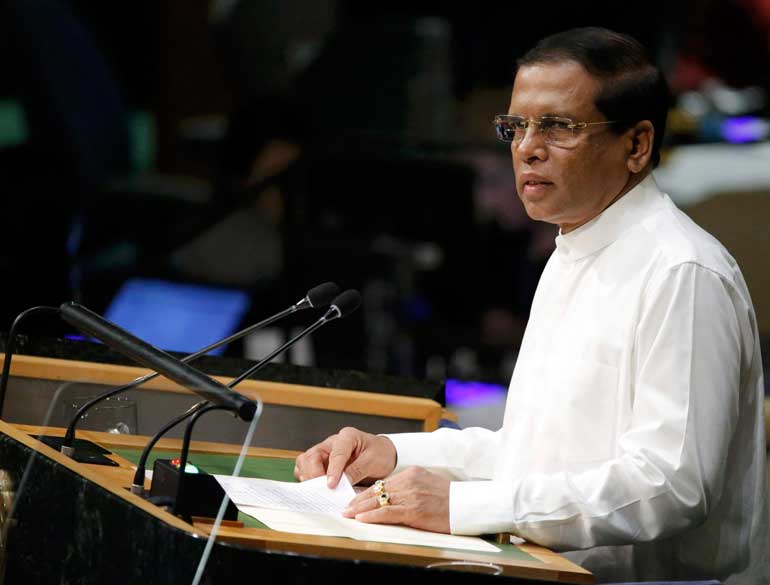Saturday Feb 21, 2026
Saturday Feb 21, 2026
Thursday, 1 October 2015 00:00 - - {{hitsCtrl.values.hits}}
 President Maithripala Sirisena addresses attendees during the 70th session of the United Nations General Assembly at the U.N. Headquarters in New York, 30 September - Reuters
President Maithripala Sirisena addresses attendees during the 70th session of the United Nations General Assembly at the U.N. Headquarters in New York, 30 September - Reuters
New York: Sri Lanka’s new vision for the country involves achieving the twin objectives of sustainable development and reconciliation, Sri Lankan President Maithripala Sirisena said.
Addressing the 70th United Nations General Assembly in New York on Wednesday, the President said Sri Lanka’s social and human development approach was founded on pluralism, reconciliation and sustainable development.
Noting that within the first six months of his presidency, his Government introduced essential amendments to the Constitution in order to strengthen democracy in Sri Lanka, the President said the new consensual Government under his leadership had already taken several steps to introduce and operationalise the reforms required.
He said the Government intended to implement a new program and plan of action to advance human rights in Sri Lanka.
“In dealing with the past, we will follow a process of truth-seeking, justice, reparation and non-recurrence,” the President said.
Speaking of terrorism, the President said Sri Lanka succeeded in eliminating terrorism, which continues to throttle other developing countries from Asia to Africa and Latin America and Sri Lanka’s conflict and post-conflict experience can be shared with the rest of the developing world.
Underscoring that for global development it was important to have a dialogue within the South as much as between the North and South, the Sri Lankan President emphasised that Sri Lanka as a country in the South could contribute immensely to nurture such South-South dialogue.
Speaking of Sri Lanka’s socioeconomic development, the President said that despite several factors militating against economic growth, Sri Lanka sustained state social welfare policies that were carried over from Independence.
“We never compromised policies such as universal free education, free healthcare and the eradication of poverty,” he said.
He stressed that youth was the driving force for sustainable development. “We should transform youth to a skilled workforce to succeed in the 21st Century,” he said.
“We should similarly launch a national program to empower women and thereby enhance their contribution in development,” he added.
A special program to protect the children and safeguard their rights is also an essential factor to develop an efficient and humane society, he said.
Highlighting three kinds of human conflicts - conflicts between human beings and nature, conflict among humans and conflict within human beings - the President said the third kind of conflict within themselves was the root cause of all three.
“Extremism, over-consumption, arbitrary exploitation of the environment, violation of human rights, vicious disparities in income are all results of our inability to overcome our craving. They cause insecurity, conflict, violation of rights and exploitation,” he continued.
President Sirisena stressed that the edifice of sustainable development should therefore be built upon the foundation of self-discipline and equity.
“I propose we national leaders take cognisance of this self-discipline and equity-based approach when drawing relevant Action Plans in the future,” he said.